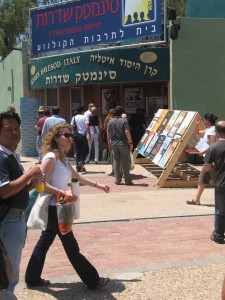 One presents an American Idol spinoff in Afghanistan as a training ground for democracy and the other how the decay of society under years of guerilla war has made rape the common fate of millions of women in central Africa. Havana Marking’s Afghan Star and Osvalde Lewat-Hallade’s A Love During the War, screened yesterday and today at Sapir College’s Cinema South International Film Festival in Sderot, southern Israel, offer glimpses of margins of the world that we hear of only when there is a genocide, or an earthshaking natural disaster, or a war so bloody that it briefly jars us out of our apathy. Tyranny, war, poverty, and distance from the West weaken and silence people, but the women who suffer them are often doubly silenced. Here some of them speak out.
One presents an American Idol spinoff in Afghanistan as a training ground for democracy and the other how the decay of society under years of guerilla war has made rape the common fate of millions of women in central Africa. Havana Marking’s Afghan Star and Osvalde Lewat-Hallade’s A Love During the War, screened yesterday and today at Sapir College’s Cinema South International Film Festival in Sderot, southern Israel, offer glimpses of margins of the world that we hear of only when there is a genocide, or an earthshaking natural disaster, or a war so bloody that it briefly jars us out of our apathy. Tyranny, war, poverty, and distance from the West weaken and silence people, but the women who suffer them are often doubly silenced. Here some of them speak out.
Afghan Star follows an instance of that most insipid of modern entertainment genres, the televised popular song competition, and shows us how it has played an important role in building democracy and human rights in a society split by ethnic and religious conflict. Following the fall of the Taliban, Afghans are allowed to sing again—music and dancing having been banned by the fundamentalist regime, along, of course, with television, film, and freedom for women. An enterprising producer on one a new private television station decides to produce a song contest on a shoestring, and the film follows several of the contestants—including two women—from the program’s first airing to the night on which the winner is declared.







